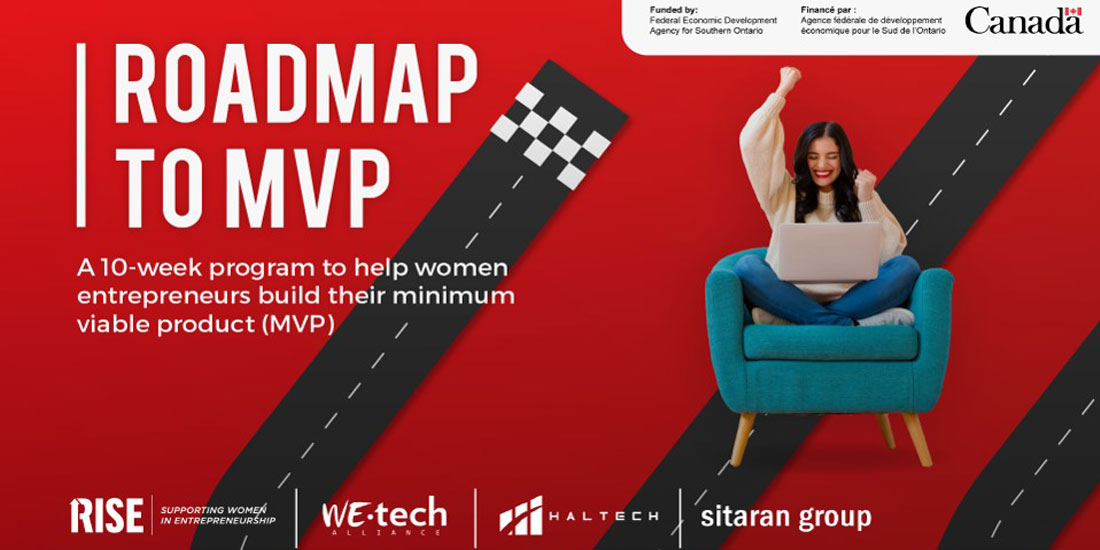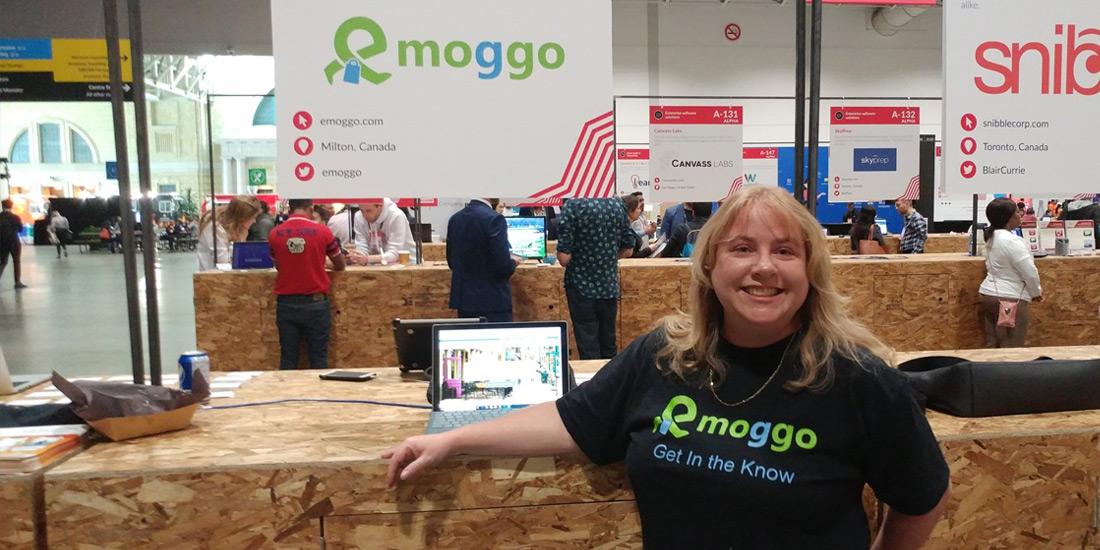
by Reema Duggal | Mar 29, 2022
Excited to be kicking off Roadmap to MVP with RISE (RISE Windsor-Essex), WEtech (Windsor Regional Innovation Center), and Haltech (Halton Regional Innovation Center).
Roadmap to MVP is a 10-week program to help you build your minimum viable product (MVP). The program aims to give woman-identifying entrepreneurs the opportunity to define and develop their MVP in a supportive and collaborative group environment. Participants will gain access to a community of other women founders and will receive 1:1 mentorship from program facilitator – Reema Duggal – President of Sitaran Group and Co-Founder of Silicon Halton.
The program modules included:
- Understanding The Product Development Lifecycle
- Defining Your Minimum Viable Product Features and Functions
- Developing Your MVP With Low Code / No Code Applications – Part 1
- Developing Your MVP With Low Code / No Code Applications – Part 2
- Developing Your MVP With External Help
Plus, there will be 5 Office Hours Sessions to ask questions and get help.

by Reema Duggal | Dec 11, 2021
Wishing everyone a very happy 2021 holiday season. May it be full of warmth and cheer.
And let’s all hope the new year is full of peace and joy!
As we enter 2022, the impact of COVID-19 is that businesses of all sizes are going through Digital Transformations. Developing a digital business roadmap and framework that aligns with your business goals is one of the most important things you can do. Customers everywhere are expecting to transact online with you at every level. Are you ready?
If you’d like to chat about what it means to build a roadmap and framework so you can plan your projects and budgets – let us know. We can help guide you.

by Reema Duggal | Mar 4, 2021
Over the last seven weeks, it has been incredibly rewarding to lead the Roadmap to MVP Program – a partnership between Haltech and Silicon Halton.
The goal was to help female entrepreneurs who may not have the technical skills required to develop a minimal viable product (MVP). This can delay entry into the market or cost female Founders more dollars up front to contract development leaving them short of funding to drive other needed activities of early stage start ups. Haltech in partnership with Silicon Halton created Roadmap to MVP as a way to accelerate through this milestone.
The program modules included:
- Defining Your Minimum Viable Product Vision / Scope
- Defining Your Minimum Viable Product Features and Functions
- Developing Your MVP With Low Code / No Code Applications
- Developing Your MVP With An Application Development Company
- Selecting An MVP Hosting / Cloud Computing Platform
- Testing and Launching Your MVP, and a
- BONUS Networking Session
Having spent a few decades in the tech industry in Marketing, Sales, Consulting, Project Management, and Practice Management – it gave me a chance to impart a significant amount of knowledge to the Founders. It also helped them understand that technical development is not as difficult as one might think.

by Reema Duggal | May 31, 2019
One of the most important things that a business owner has to decide in their Ecommerce Journey, is the route they are going to take in their application strategy: package implementation, SAAS, or custom implementation. There are really important differences in all three – and the right solution depends on you and your company.
Package, SAAS, or Custom – What Do They Mean?
A Package Implementation means you’re going to:
- Use an application that has been built for your industry that has all the business functions, data constructs, and workflows built in.
- You’ll have the opportunity to configure (no coding) the application with your data so the applications works for you.
- You’ll also have the opportunity to customize (coding involved) with your specific workflows / data requirements by purchasing plugins or hiring a developer to customize the application. Although, every time there is an upgrade from the application vendor, the customizations may need updating also.
- Host the appication on your servers or in a shared hosting environment
- Typical platforms can include WooCommerce, Magento, OpenCart
A SAAS Implementation means you’re going to:
- Use an application that has been built for your industry that has all the business functions, data constructs, and workflows built in
- Have the opportunity to configure (no coding) the application with your data so the applicatiion works for you.
- Have the ability to purchase approved plugins that can add functionality.
- Not have the opportunity to customize (coding involved) with your specific workflows / data requirements – as source code is not changeable.
- Subscribe to the platform by paying a monthly fee to run and host the site for you – generally worry free.
- Typical platforms include Shopify, BigCommerce, Magento
A custom implementation means you’re going to
- Build an application with the business, data constructs, and workflows exactly as you need them for your business
- Hire a team including business analysts and developers to design and develop this custom application
- Customize the application to your heart’s content
- Update and upgrade with new features whenever you want
- Typical application development platforms could be Azure, Ruby on Rails, PHP
So, How Do You Decide?
Reasons to go with a Package Implementation:
- Process – Your business can fit into the package.
- People – You’ll have access to a talent pool with skills in that package, and to a community of users and support forums that discuss business and technical issues
- Technology – You are comfortable maintaining the application and the hosting environment
- Money – There are open source application like woocommerce that free. But learning curve and plugins will add dollars. Other applications charge a monthly licensing fee on a per seat basis.
Reasons to go with a SAAS Implementation:
- Process – Your business can fit into the package.
- People – You’ll have access to a talent pool with skills in that package, and to a community of users and support forums that discuss business and technical issues
- Technology – You are NOT comfortable maintaining the application and the hosting environment.
- Money – For smaller companies with limited inventory and limited orders, SAAS is a godsend. For a fixed small fee per month + a per transaction fee – one can get started. However, when your volumes go up, and customer complexity in contract pricing comes into play, SAAS can become expensive. Also integrations to inventory management systems become expensive. Understanding total cost of ownership at every order volume / revenue level is really important.
Reasons to go with a Custom Implementation:
- Process – Your business cannot fit into a package or SAAS implementation
- People – You have an in-house or outsourced IT team that is capable of building, documenting, hosting, and supporting the application
- Technology – You are comfortable with all aspects of designing, building, and maintaining the application and the hosting environment
- Money – More money spent up front on people, processes, and technology. Licensing costs will be less. Transaction fees will be less. Maintenance and updates will be more.

by Reema Duggal | May 24, 2019
This week I attended the Collision Conference 2019 in Toronto. Over 25,000 attendees from 125 countries, 730 speakers, and 1100 startups. Wowed by the amount to speakers, sessions, and topics. Felt like I was drinking from a tech fire hose for three days. I learned a lot. 10 things I’d like to share:
Looking to build an application but know nothing about technology?
Check out London, UK based engineer.ai. They’ve productized software development by letting you choose the type of application you want to emulate, the features in the application that are important to you, the platforms you might want it on, and the maintenance you require. Oh yeah, and you can see how your pricing and timeline will change in real time. Pretty cool stuff.
So Happy for Lisa Denis of Emoggo
Silicon Halton supermember Lisa Denis was selected for the COLLISION ALPHA Program – giving the spotlight to early-stage startups with outstanding potential and connecting them to influential names and resources. Emoggo is the better way to explore and experience nearby places to shop, eat, and connect. Check her out on Twitter or the EMOGGO website.
 Lisa Denis, Founder, Emoggo | photo credit: Lisa Denis
Got aching feet? Want comfortable and supportive custom-fit footwear?
Check out Vancouver, Canada based wiivv.com. They build custom fit footwear from your phone. You download their app and take pictures of your feet. They digitally map your feet to 200 points. Then, they create custom sandals or orthotics at a great price. They’re a startup that has partnered with Dr. Scholls to deliver custom 3D printed inserts for their customers. Canadian startup helping a 100 year old company innovate.
Have you seen the crazy filters on Snapchat that change your gender? They are agugmented reality filters.
Listened to a fascinating conversation Eitan Pilipski, VP of Camera Platform, Snap Inc. talk about how they see themeselves as a camera company that is reinventing the camera and putting augmented reality into the hands / eyes of their customers. In the future, these crazy fun filters may morph into educational / industrial uses.
Cyber attacks and data breaches cost consumers, companies and countries billions of dollars annually.
Hacked and dumped, or leaked identity information is proliferating in the surface, social, deep and dark web and bad actors are using this information to launch new attacks. Monical Pal, CEO of 4iQ spoke of how her company continuously collects exposed identity information found in open sources, curates the collections of compromised identities, and then helps protect consumers from identity theft and investigate fraud, financial crimes and other threats.
Is Entrepreneurship in Crisis? Did you know there were more entrepreneurs in 1970’s?
Canada’s Tobias Lütke, founder and CEO of Shopify, one of the world’s leading commerce platforms, discussed the current state of entrepreneurship and the most pressing issues facing today’s brands, from small and medium businesses to major retailers. His mission, make it easy for everyone to become an entrepreneur, whether they understand tech or not. So far, he has 800,000 customers and is doing over 1 billion in revenue.
Lisa Denis, Founder, Emoggo | photo credit: Lisa Denis
Got aching feet? Want comfortable and supportive custom-fit footwear?
Check out Vancouver, Canada based wiivv.com. They build custom fit footwear from your phone. You download their app and take pictures of your feet. They digitally map your feet to 200 points. Then, they create custom sandals or orthotics at a great price. They’re a startup that has partnered with Dr. Scholls to deliver custom 3D printed inserts for their customers. Canadian startup helping a 100 year old company innovate.
Have you seen the crazy filters on Snapchat that change your gender? They are agugmented reality filters.
Listened to a fascinating conversation Eitan Pilipski, VP of Camera Platform, Snap Inc. talk about how they see themeselves as a camera company that is reinventing the camera and putting augmented reality into the hands / eyes of their customers. In the future, these crazy fun filters may morph into educational / industrial uses.
Cyber attacks and data breaches cost consumers, companies and countries billions of dollars annually.
Hacked and dumped, or leaked identity information is proliferating in the surface, social, deep and dark web and bad actors are using this information to launch new attacks. Monical Pal, CEO of 4iQ spoke of how her company continuously collects exposed identity information found in open sources, curates the collections of compromised identities, and then helps protect consumers from identity theft and investigate fraud, financial crimes and other threats.
Is Entrepreneurship in Crisis? Did you know there were more entrepreneurs in 1970’s?
Canada’s Tobias Lütke, founder and CEO of Shopify, one of the world’s leading commerce platforms, discussed the current state of entrepreneurship and the most pressing issues facing today’s brands, from small and medium businesses to major retailers. His mission, make it easy for everyone to become an entrepreneur, whether they understand tech or not. So far, he has 800,000 customers and is doing over 1 billion in revenue.
 Tobias Lutke, CEO Shopify | photo credit: Collision Conference
Saving the Planet With Technology
Jennifer Marsman from Microsoft discussed their AI for Earth program – $50 million in grants to projects that use artificial intelligence to address four critical areas that are vital for building a sustainable future – climate, agriculture, biodiversity, and water.
Who Is Afraid Of Automation?
Will humans be replaced by robots? Well, it depends. Navdeep Bains – Minister of Innovation, Science and Economic Development, Government of Canada; Dmitry Grishin – Founder, Grishin Robotics; and Daphne Koller – CEO, Insitro had a really good discussion about the impact of automation on our jobs. Learned more about Canada’s Innovation and Skills Plan – and the safeguards they tried to put in place to ensure people and reskilling come first in the world of automating everything. And, also learned that Canada had just signed in May 2019 the Declaration of the International Panel on Artificial Intelligence (IPAI), and released further details on the Panel that will see Canada and France working together to guide the responsible development of artificial intelligence. The Panel will be an organization dedicated to AI and plans to bring together some of the world’s “greatest global AI experts.” It hopes to be a global reference point in the development of AI, rooted in human rights, inclusion, diversity, innovation, and economic growth.
Where Are Investors Putting Their Money? Seems Everywhere.
Sat in on three different investor focused sessions (there were at least a dozen). These 5 areas caught my attention: artificial intelligence in every industry; saving the planet; reinventing food; enterprise software reinvention; and digital health. Investors included: Brendon Kim – Samsung NEXT; Karin Klein – Bloomberg Beta; Christine Tsai – 500 Startups; Anu Duggal – Female Founders Fund; Tim Draper – Draper Associates; and Ann Winblad – Hummer Winblad.
2019 COLLISION PITCH Champion
Watched the finalists of the COLLISION startup competition battle it out for the title of 2019 PITCH champion. Finalists included: Chelsea Fawn Briganti from Loliware – biodegradeable seaweed straws; Dickson Nsofor from Korapay – Africa Payment Infrastructure; and Phaedra Randolph from Spero Foods – dairy and eggs reinvented. Great to see Loliware win to save the planet!
Tobias Lutke, CEO Shopify | photo credit: Collision Conference
Saving the Planet With Technology
Jennifer Marsman from Microsoft discussed their AI for Earth program – $50 million in grants to projects that use artificial intelligence to address four critical areas that are vital for building a sustainable future – climate, agriculture, biodiversity, and water.
Who Is Afraid Of Automation?
Will humans be replaced by robots? Well, it depends. Navdeep Bains – Minister of Innovation, Science and Economic Development, Government of Canada; Dmitry Grishin – Founder, Grishin Robotics; and Daphne Koller – CEO, Insitro had a really good discussion about the impact of automation on our jobs. Learned more about Canada’s Innovation and Skills Plan – and the safeguards they tried to put in place to ensure people and reskilling come first in the world of automating everything. And, also learned that Canada had just signed in May 2019 the Declaration of the International Panel on Artificial Intelligence (IPAI), and released further details on the Panel that will see Canada and France working together to guide the responsible development of artificial intelligence. The Panel will be an organization dedicated to AI and plans to bring together some of the world’s “greatest global AI experts.” It hopes to be a global reference point in the development of AI, rooted in human rights, inclusion, diversity, innovation, and economic growth.
Where Are Investors Putting Their Money? Seems Everywhere.
Sat in on three different investor focused sessions (there were at least a dozen). These 5 areas caught my attention: artificial intelligence in every industry; saving the planet; reinventing food; enterprise software reinvention; and digital health. Investors included: Brendon Kim – Samsung NEXT; Karin Klein – Bloomberg Beta; Christine Tsai – 500 Startups; Anu Duggal – Female Founders Fund; Tim Draper – Draper Associates; and Ann Winblad – Hummer Winblad.
2019 COLLISION PITCH Champion
Watched the finalists of the COLLISION startup competition battle it out for the title of 2019 PITCH champion. Finalists included: Chelsea Fawn Briganti from Loliware – biodegradeable seaweed straws; Dickson Nsofor from Korapay – Africa Payment Infrastructure; and Phaedra Randolph from Spero Foods – dairy and eggs reinvented. Great to see Loliware win to save the planet!
 Chelsea Fawn Briganti, CEO Loliware | photo credit: Collision Conference
And so many sessions I missed. Just not enough time to get to all the parallel sessions.
But I understand that the COLLISION Team will be putting videos up of many of the sessions on the COLLISION YouTube Channel.
Will I be there next year? You bet – already in my calendar!
Chelsea Fawn Briganti, CEO Loliware | photo credit: Collision Conference
And so many sessions I missed. Just not enough time to get to all the parallel sessions.
But I understand that the COLLISION Team will be putting videos up of many of the sessions on the COLLISION YouTube Channel.
Will I be there next year? You bet – already in my calendar!






 Lisa Denis, Founder, Emoggo | photo credit: Lisa Denis
Got aching feet? Want comfortable and supportive custom-fit footwear?
Check out Vancouver, Canada based
Lisa Denis, Founder, Emoggo | photo credit: Lisa Denis
Got aching feet? Want comfortable and supportive custom-fit footwear?
Check out Vancouver, Canada based  Tobias Lutke, CEO Shopify | photo credit: Collision Conference
Saving the Planet With Technology
Jennifer Marsman from Microsoft discussed their
Tobias Lutke, CEO Shopify | photo credit: Collision Conference
Saving the Planet With Technology
Jennifer Marsman from Microsoft discussed their  Chelsea Fawn Briganti, CEO Loliware | photo credit: Collision Conference
And so many sessions I missed. Just not enough time to get to all the parallel sessions.
But I understand that the COLLISION Team will be putting videos up of many of the sessions on the
Chelsea Fawn Briganti, CEO Loliware | photo credit: Collision Conference
And so many sessions I missed. Just not enough time to get to all the parallel sessions.
But I understand that the COLLISION Team will be putting videos up of many of the sessions on the